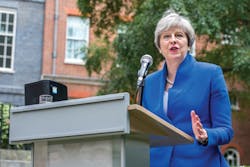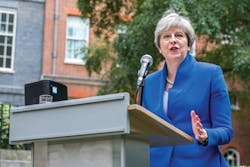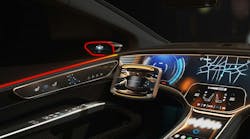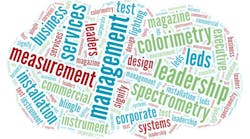No one really knows how the divorce of the UK from the European Union will work. The lighting industry is no different. Few see smooth sailing. The rough waters might deliver tariffs and checkered product requirements. Some fear the incandescent bulb could even make a comeback. MARK HALPER reports.
Stripping out all the rancor that goes with it, the one word that sums up the United Kingdom's pending split from the European Union is "uncertainty." Most voters who approved the move on June 23, 2016 had no clue exactly what they were prescribing. Even Prime Minister Theresa May, who took office three weeks after the referendum, has looked befuddled. The best explanation she could offer for nearly a year was "Brexit means Brexit" — whatever that meant.
Interested in articles & announcements on SSL business developments?
The government has padded its words and proposals since then, but the uncertainty hasn't lifted. If anything, it has gotten worse. May formally launched the departure in late March by invoking Article 50, establishing a two-year deadline of March 29, 2019, without saying how. Her government issued its first formal plan on July 13, submitting a bill to Parliament carrying the oddly parenthetical title the European Union (Withdrawal) Bill. It's popularly known both as the Great Repeal Bill and as the Repeal Bill — echoing the uncertainty, even the nomenclature of the legislation seems to shift.
Simply put, the bill cancels the 1972 European Communities Act that made Britain part of the EU and gave European laws precedence over those passed by Parliament. It also ousts the European Court of Justice.
In principle, the Great Repeal Bill might look easy enough. It takes existing EU directives — which are already British law — and transforms them into new British laws, ensuring continuity to businesses and individuals. But in practical terms, the bill has triggered profound objections and, to say the least, arguments. Although old laws are supposed to "transform" in a way that changes their jurisdiction but not their meaning, gray areas abound. Opposition leaders have vowed "hell," general observers have described the momentous task as the biggest job for Britain's civil service since World War II, and the members of May's own cabinet were at each other's throats as of this writing.
As if that weren't enough, doomsayers were warning of a chaotic "crashing out of Europe" if Britain and the EU can't agree on the financial price that the UK has to pay to settle its bills before leaving. Then there's the unknown matter of trade and tariffs.
And all of that is just part of the maelstrom.
So if anybody really knows how the divorce will affect the lighting industry, please stand forward. As the head of the professional trade body that represents the UK's lighting industry notes, it has been difficult to liaise with the government and to establish a firm understanding of Brexit's nuts-and-bolts impact.
"We basically know very little, and everything we say is speculation," said Peter Hunt, chief operating officer of the Telford, England-based Lighting Industry Association (LIA), when LEDs Magazine spoke with him in the middle of the summer, just before May issued the Repeal Bill. "It's been very frustrating for the last year. It's been difficult to articulate the industry position, because trying to find somebody who will actually talk to you is uncommonly difficult."
Repeat: "Uncommonly difficult."
The open question
With that as the backdrop, it's no wonder that Hunt and others are full of trepidation over what might happen, especially when keeping in mind that 68% of the LIA's members were opposed to Brexit prior to the momentous June 2016 public thumbs-up.
A top priority for both the LIA and European trade association LightingEurope is to preserve the open market access that all EU countries, including the UK, today have with each other. Changes to two things — product regulations and tariffs — could upset that.
"I suppose our number one concern is we don't want to see the UK digress from European legislation in terms of products," Hunt said. While the UK is still part of the EU until March 2019, the rules for conforming to lighting safety are clear. So are the rules for voltages, and for energy efficiency of lamps.
But there is no guarantee that the UK will continue to conform to EU regulations in any or all of those areas.
Take energy efficiency, for example. The EU is currently in the middle of rewriting its requirements for minimum energy efficiency of bulbs. It is consolidating three laws into one that will govern all light sources, including LEDs in an undertaking that it calls the Single Lighting Regulation. LightingEurope and the LIA are already working hard trying to hammer out differences with the EU on details of the new regulation, which could take effect in 2019 — perhaps in time to still include the UK.
"The concern would be, if after we've adopted the legislation into UK law, from that point on, what happens?" asked Hunt. "Do we continue and not update as the EU updates their regulations? Do we then diversify and start to have little extras or little changes in the UK, which at some point means we end up with two different kinds of products, one for the UK and one for Europe?"
It wouldn't be the first time that Britain has stood out in an idiosyncratic way. After all, it puts steering wheels on the righthand side of cars and trucks. But nobody's hankering to place lighting on the other side of the road. As Hunt noted, when you consider the difficulties of adjusting to different product specifications for lighting, "Industry doesn't want that." It's safe to say those thoughts reflect the perspective of companies on the Continent as well.
Similar concerns apply for safety regulations (Europe has a CE marking that is somewhat analogous to the UL certification mark in the US) and for low-voltage regulations.
"In Europe, if you want to place a product in the market, you have to have a CE marking that links up to a specific set of rules," noted Ourania Georgoutsakou, secretary general of Brussels-based LightingEurope. "That is a marking that is an assumption of conformity to the rules that you have to satisfy in terms of safety of your product in order to be able to place it on the market. So if you have that marking and you apply that new harmonized rule, then you can access any part of the EU market. With Brexit, we ask ourselves the question, 'What rules do we have to satisfy in order to place a product on the UK market, and vice versa, what rules does a product coming from the UK have to satisfy in order to be placed on the EU market?' Today we all have to satisfy the same rules. We wonder what the implications of those product placement rules will be, if there's any change in that and are there are any different requirements that need to be satisfied. One of the great achievements in Europe is that you have one set of rules that applies to all 28 countries. That keeps the access simpler."
To tariff, or not to tariff
While consistent product rules are top of mind, uncertainty regarding tariffs is also right up there. EU countries allow goods to flow between them tariff-free. There is no guarantee that will be the case between a standalone UK and Europe.
"The second concern has got to be the implication of tariffs — making product more expensive and not having that free movement of goods in the European Union," said Hunt. "The potential problem then is, in order to counter tariffs, governments may be put in a position where they have to reduce corporation tax on exports, and then you end up with a sort of race to the bottom. That's really not where we want to be. We'd rather have tariff-free movement of goods."
Another matter that underlies all of this is the possibility that the UK could drift away from the environmental ethos that has helped emphasize the importance of LED lamps and luminaires in conserving energy. An efficiency that is now some 90% greater than filament bulbs has driven the EU — and thus the UK — to establish directives that phase out incandescent lamps on a staggered schedule of wattages and styles, which is picking up pace.
Hunt and the LIA worry that UK policy could de-emphasize all of that — that the British government could back off the EU-connected environmental and low-carbon priorities that have helped to drive the uptake of LED lighting.
"When you come on to environmental issues, that's where we have some concerns where the UK might digress from the path that Europe's taking," he noted. "Already we're seeing the UK government wheeling back on green issues. We are concerned that energy efficiency is taking a bit of a backseat in terms of policy."
That remains especially true given that LEDs will most likely gain efficiency and that they provide additional energy savings because users can control their on/off and brightness levels to a larger extent than other light sources. On top of that, they yield maintenance and materials savings — another environmental boost on an increasingly resource-challenged planet — via their purported long life of 10 to 20 years or more.
"Rather than build Hinkley Point [a new government-backed nuclear plant] and new power stations, we'd rather see policies that emphasize energy efficiency, because we still believe there's a long way to go," said Hunt. "And lighting has [provided] a huge amount of energy savings, and it has more to give. So we'd like to see policies much more directed toward energy efficiency, and our concern is that with Brexit, that might not be top of the pile."
Return of the incandescent?
It's even possible that the "leave" government could rediscover a fondness for energy-guzzling incandescent bulbs. "It's understood that green issues are less important to those who voted to leave the European Union and if you've got policies bringing back incandescent lamps, that's a major concern," said Hunt. "It's a complete reversal of energy policy."
He has some reason for the collywobbles. After all, the mercurial political party that helped drive Brexit — the UK Independence Party (UKIP) — has been known to espouse anti-government incandescent yearnings.
"Once free of the EU, I would like to see an end to the demonization of the incandescent light bulb, which was invented by Thomas Edison well over a century ago," said UKIP's environment boss (and a member of the European Parliament) Julia Reed last February. "The fact that it continued in production for so long is tantamount to its being a good design, which was cheap to produce. These bulbs were banned by the EU because they were deemed to be inefficient due to the amount of heat they produce, however, in a country like ours, where the temperatures fall as soon as it gets dark, this wasn't unwelcome. Incandescent light bulbs have been replaced by a number of alternatives which are more expensive and in some cases unpopular. Take the compact fluorescent lamp, for example, which doesn't produce a warm light, takes longer to get bright (especially in colder weather), and contains mercury vapor, which is a problem when you break one."
Although UKIP has rapidly faded as a driving force since helping to push through the "yes" vote, its sentiment still lingers.
"I don't believe the industry will go back to incandescents," Hunt said. "But it's just a signal that energy efficiency might not be as high a priority on the government's list of policies as we would like to see."
Another person with similar concerns is Nigel Harvey, CEO of Recolight, a Croydon, England company that oversees lamp recycling schemes that conform with EU Waste Electrical and Electronic Equipment (WEEE) law.
"There were some people, hopefully misguided, who were tweeting once the Brexit result was known that 'This is great, that we can keep our old incandescent light bulbs,'" Harvey said. "Others were saying, 'It's great, we don't have to recycle anymore.' I hope all of that is not true and it's not going to happen. I don't think the government would want to see the reintroduction of incandescent. When the country at the moment seems to have some challenges on power supply, the last thing you'd do is encourage products that are excessive users of electricity."
Giving it a label
Of real concern: Harvey noted that while the Repeal Bill should create new UK law out of UK law that originated from EU directives, not all lighting practices are governed by such laws. Things such as recycling, voltage, and electromagnetic regulation are. But regulations governing energy performance as well as packaging and labeling are not. Harvey described them as EU regulations rather than as directives, and as such they never became formal statutes in the UK. They've had the "force of law" by default via the European Communities Act of 1972 — the same act that the Repeal Bill abolishes in the UK.
That means new laws concerning decisions such as how to label a bulb or any electrical appliance — the current system applies an A-through-G rating, with A+++ being the most efficient — could potentially give way to something else, he noted.
Brexit could deliver the UK industry one possible "small chunk of light" if new British laws help close loopholes that today allow lamp manufacturers to sell through independent online retail sites without gaining the required WEEE certification. WEEE requires all lamp manufacturers to participate in a scheme that recycles and reuses lamps and materials. A Recolight study that's part of a report for the Organization for Economic Co-operation and Development (OECD) recently revealed that 20% of all bulbs sold through independent online sites fail to comply, with most of them coming from China.
Macroeconomics
In another big worry, Harvey said inflation (caused in part by pound sterling's Brexit-related decline in value) and other macroeconomics could paint a grim picture for big commercial LED projects in the UK. Such projects already require a greater upfront capital cost than, say, fluorescents; thus, LED could lose out.
"By the end of this year, inflation will be nudging 5%, whereas wage inflation will still be between 1 and 2%," Harvey said in an interview with LEDs this past July. "That means people will be getting 3% worse off in real terms. That in turn could reduce consumer confidence, and push us over into recession by the beginning of next year. And then you have a generic impact that will have the potential to really be quite serious for our industry. Whereas we're getting major retailers, banks, hospitality companies, and others flipping from traditional to LED lighting — if they get a squeeze, then this is the type of investment they might stop."
Not everyone is as worried as Harvey about the big economic picture. The UK economy, as of this writing, was on balance holding up stronger than people had expected after the first year and quarter or so of the "yes" vote.
But many people, like Harvey, contend that a downturn is around the corner. There's that uncertainty again.
The industry is certainly wary. One anecdotal sign of that: None of the many lighting companies that LEDs approached for comment for this story were either willing or able to participate. Most did not even reply to our emails.
For the moment, it seems that Prime Minister May's initial long-running explanation still applies: Brexit means Brexit.
MARK HALPER is a contributing editor for LEDs Magazine, and an energy, technology, and business journalist ([email protected]).
LINKS
LEDs Magazine recognizes that political events which impact business around the globe are in constant flux, and the information can change rapidly when we're caught up on deadline. This article reflects the perspectives of leading industry thinkers at a moment in time before publication. In the tumultuous world of Brexit, some of the facts might have changed in the interim. The following resources may help provide additional context on the evolution of Brexit and the lighting industry.
The Lighting Industry Association https://www.thelia.org.uk
LightingEuropehttps://www.lightingeurope.org
Recolight https://www.recolight.co.uk
A Brexit guide from the BBChttps://www.bbc.co.uk/news/uk-politics-32810887
The UK government's Brexit policy sitehttps://www.gov.uk/government/policies/brexit









